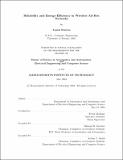Reliability and energy-efficiency in wireless ad-hoc networks
Author(s)
Srinivas, Anand, 1979-
DownloadFull printable version (461.2Kb)
Other Contributors
Massachusetts Institute of Technology. Dept. of Electrical Engineering and Computer Science.
Advisor
Eytan Modiano.
Terms of use
Metadata
Show full item recordAbstract
In this thesis, we address issues related to reliability and energy-efficiency in wireless ad hoc networks. In the first part of the work, we deal with the problem of simultaneously routing data along multiple disjoint paths from a source to destination in the most energy efficient manner. To this end, we developed and analyzed both optimal and heuristic algorithms that find minimum energy node and link disjoint paths in a wireless ad hoc network. Our major results include a novel polynomial time algorithm that optimally solves the minimum energy 2 link-disjoint paths problem, as well as a polynomial time algorithm for the minimum energy k node-disjoint paths problem. Additionally, we demonstrate via simulation that when disjoint path routing is employed, network lifetime is significantly extended when our routing algorithms (in combination with a simple heuristic) are used. In the second part of the work, we deal with a slightly different reliability problem. In particular, we consider the problem of how to best ensure that QoS sessions (e.g. those with a minimum capacity requirement) do not get dropped after their primary path has failed. Our methodology is to attempt to eliminate one potential cause of session drops, i.e. the inability for the interrupted session to find a backup path with sufficient capacity. To this end, we developed a spare capacity allocation scheme whereby we a-priori reserve backup capacity in the network. We demonstrate the effectiveness of this scheme via simulation, and we show that in certain scenarios of reasonably high network load and node mobility, the probability of session drop can be substantially lowered through minimal backup capacity allocation.
Description
Thesis (S.M.)--Massachusetts Institute of Technology, Dept. of Aeronautics and Astronautics; and, (S.M.)--Massachusetts Institute of Technology, Dept. of Electrical Engineering and Computer Science, 2004. Includes bibliographical references (p. 79-83). This electronic version was submitted by the student author. The certified thesis is available in the Institute Archives and Special Collections.
Date issued
2004Department
Massachusetts Institute of Technology. Department of Aeronautics and Astronautics; Massachusetts Institute of Technology. Department of Electrical Engineering and Computer SciencePublisher
Massachusetts Institute of Technology
Keywords
Aeronautics and Astronautics., Electrical Engineering and Computer Science.